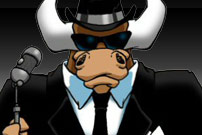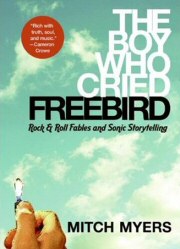 With the temperature dropping, it's time to find someone to keep you warm. Find your hookups with our online dating guide!
With the temperature dropping, it's time to find someone to keep you warm. Find your hookups with our online dating guide!
- Fiction / Non-Fiction
- 2008
- Buy the book
Reviewed by Jeff Giles
()
he literary equivalent of rock-crit spumoni, Mitch Myers’ “The Boy Who Cried Freebird” takes all the main ingredients of modern music writing – straightforward journalism, possibly fictional first-person tales, short stories, et cetera – and mashes them all together to create a dish that, although mostly delicious, will seem annoyingly slapdash to people who like to keep their plates cleanly organized.
Overlong metaphors aside, “Freebird” – which saw hardcover release last year, and is now making the leap to paperback – is a deeply curious book. Fans of Myers’ writing, and his appearances on NPR’s “All Things Considered,” will come to “Freebird” already well acquainted with his hopscotching style, but newcomers are likely to find themselves disoriented by the way he bounds from in-depth write-ups (like his wonderful piece on Doug Sahm, included here) to short fiction (including stories of Adam Coil, the titular concert-wrecking lout). There’s even a murder mystery in here.
It’s all entertaining, and the humor is as off-kilter as you’d hope from Shel Silverstein’s nephew. The problem – for hardcore fans of music writing, anyway – is that not much of it will make you feel. While the Sahm piece might make you want to run out and grab a best-of package, and Myers’ funny take on Lou Reed’s anti-classic Metal Machine Music is funny and/or thought-provoking, the bulk of the book doesn’t leave much of a lasting impression. The best of the fictional bunch are the Adam Coil entries, which follow the multi-generational exploits of the rock-lovin’ Coils (Adam is the first guy to yell “Freebird” at a concert; his descendant, also named Adam, travels back in time to see the Dead), but as pleasantas those detours are, you may wish they’d been excised in favor of expanded looks at Terry Riley and Frank Zappa. Myers clearly knows his stuff, but he won’t sit still. It seems as though he felt like he needed to grab readers’ attention with how much he can do, which is a shame; by the time he gets warmed up, he’s already moving on to the next subject/genre/whatever.
Still, it’s impossible to argue with Myers’ writing. He’s funny, and he has a gift for flow, which makes “The Boy Who Cried Freebird” perfect for long trips or airplane rides, and the book absolutely lives up to its title. It isn’t really a rock-crit book, but you get the impression Myers didn’t intend for it to be. Problem is, what he did intend is hard to figure out. If you’ve got a love of rock & roll, some time to kill, and a few bucks burning a hole in your pocket, “Freebird” will make a fine addition to your reading list. Just don’t expect to give it much thought after you put it down.
You can follow us on Twitter and Facebook for content updates. Also, sign up for our email list for weekly updates and check us out on Google+ as well.











